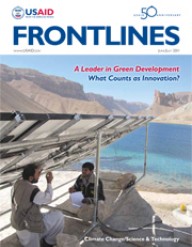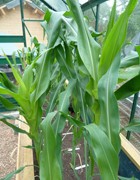In rural Malawi, each hospital serves hundreds of thousands of patients within a 100-mile radius. To reach remote patients, hospitals rely on trained volunteer community health workers. It was at one such hospital that Josh Nesbit met Dickson Mtanga, a subsistence farmer and health volunteer. Dickson had to walk 35 miles to submit hand-written reports on 25 HIV-positive patients in his community.
And yet the information could have been transmitted via SMS messaging (cell phone-based text messaging) in 35 seconds.
In February 2009, Josh Nesbitt, Isaac Holeman, and a group of students from Stanford and Lewis & Clark universities founded FrontlineSMS:Medic. The organization would later become Medic Mobile and would begin to change the face of rural health care for many thousands of people in Malawi and beyond. The mission was to help health workers communicate, coordinate patient care, and provide diagnostics using low-cost, appropriate technology.
The project has received assistance from a unique government and private-sector partnership led by USAID, NASA, Nike Inc., and the State Department dubbed LAUNCH. Its goal is to identify, support and help take to market creative technologies and other solutions that address global sustainability problems-especially those related to international development. Medic Mobile is now working with another LAUNCH innovator-Ozcan Research Group at the University of California, Berkeley-to tie microscopes to cell phones to do field-based lab tests and send the tests to the clinics centrally.
Since its inception in March 2010, LAUNCH has assisted 20 such projects, many of which may be positioned for large-scale impact on international development challenges.
“It is always exciting and invigorating to work with new and innovative thinkers, and the LAUNCH: Health Forum was no exception,” said USAID Deputy Assistant Administrator for Global Health Amie Batson, referring to an event sponsored by the LAUNCH partner organizations, and held last fall at the Kennedy Space Center in Florida. “Having this kind of dialogue with the minds who are working on real-world solutions is an important role for USAID. This program, which puts innovators at the center, has paid real dividends not only for the participants. My Global Health colleagues and I have also continued to apply lessons and practices we took away from LAUNCH in our work at USAID, which was a somewhat unexpected result we really appreciate.”
Salty Water
Another project LAUNCH is helping bring to scale is dubbed the Root Hydration System, developed several years ago by Design Technology & Irrigation Ltd. with support from DuPont.
“Planet Earth has a total of about 326 million cubic miles of water—the problem is, virtually all of it is too salty or too polluted to irrigate plants and grow food or pasture with,” explains LAUNCH water innovator Mark Tonkin.
Desalinating, filtering, and irrigating in one pass, the Root Hydration System has a piping network that is driven by the humidity gradient, making the system extremely water efficient while using virtually no power.
“At its core,” says Tonkin, “it is extremely simple.” The device consists of pipes made from active hybrid Dutyion™ polymer material that are installed at root depth, and then filled with water—fresh, salted, or brackish.
The water permeates through the pipe walls from the wet side to the dry side, emerging as vapor, leaving virtually all the salts and contaminants inside, hydrating the plants’ root zone with clean water vapor.
The first semi-commercial trial took place in 2007 in the United Arab Emirates and was chosen to be an extreme test of the system—extreme temperatures, extreme lack of rainfall, and salty groundwater—and yet 200 prosopis trees still grew.
As this is a new technology, it will require new techniques and novel approaches. But the potential for using salted groundwater directly for irrigation is a benefit to water stressed regions which experts believe cannot be ignored.
Piloting Results
In the case of Medic Mobile, results have been quick to show. In six months, the pilot in rural Malawi saved hospital staff an estimated 1,200 hours of follow-up time and over $3,000 in motorbike fuel. Over 100 patients started tuberculosis treatment after their symptoms were noticed by community health workers and reported by text message.
The SMS network brought the Home-Based Care unit to the homes of 130 patients who would not have otherwise received care; and texting saved 21 antiretroviral therapy monitors roughly 900 hours of travel time, eliminating the need to hand deliver paper reports.
In less than one year, Medic Mobile expanded from 75 to 1,500 end users linked to clinics serving approximately 3.5 million patients. Growing from the first pilot at a single hospital in Malawi, the organization established programs in 40 percent of Malawi’s district hospitals and implemented projects in nine other countries, including Honduras, Haiti, Uganda, Mali, Kenya, South Africa, Cameroon, India, and Bangladesh.
That is just the beginning for LAUNCH. The core team, made up of five people from USAID and NASA, has been selected as a finalist for the prestigious Service to America Medal in the science & environment category. The team is currently designing the third LAUNCH “cycle,” which will focus on energy. The LAUNCH: Energy Forum will be held at the Kennedy Space Center in Florida in late October 2011.
“USAID’s commitment to LAUNCH is a sign of our broader commitment to marrying the power of breakthrough science and technology solutions for international development with an open innovation approach that invites in and supports new solvers,” said Alex Dehgan, science and technology adviser to the USAID Administrator. “The large development challenges of the 21st century demand open innovation approaches like LAUNCH, and we will continue to refine and support them.”
See also CNN Global Public Square.










Comment
Make a general inquiry or suggest an improvement.